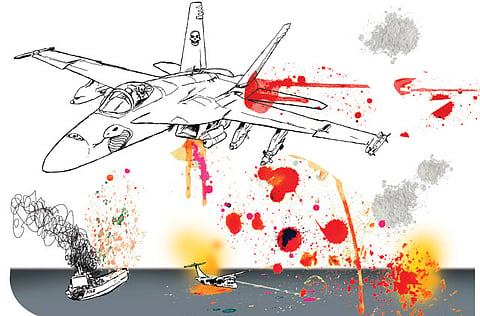A defanged plot in The Cobra
A former CIA killer-agent is hired to wipe out the narcotics industry

The United States President is so moved by the death of the teenage grandson of a White House waitress due to an overdose that he decides a no-holds-barred war on the drug cartels is the answer.
He secures the support of the ever-faithful British government. The smuggling of cocaine is secretly reclassified as terrorism and the druglords are now to be decimated as ruthlessly as America kills its Al Qaida enemies in the Middle East and South Asia.
And the president (who is not mentioned by name but helpfully has a Kenyan father) has found the right guy for the job: former CIA killer-agent Paul Devereaux aka the Cobra, who has been retired for being "too ruthless".
To sign on, he demands and gets a budget of $2 billion (Dh7.34 billion), complete cooperation from American law-enforcement agencies and a crack team of US and British special forces at his disposal. Then he sets about destroying the narcotics industry by targeting its supply lines on the high seas and in the air.
Frederick Forsyth aficionados, alas, are bound to be disappointed by his latest offering, The Cobra. The man who gave us such memorable page-turners as The Day of the Jackal, The Odessa File and The Dogs of War (which served as the prototype for Mark Thatcher and his mercenary friends in their failed attempt to topple oil-rich Equatorial Guinea's dictator in 2004) seems to have, as they say, lost the plot.
Devereaux's plan is to destroy the stuff before it gets into the hands of criminal gangs in North America and Europe, who "cut" it up to seven times to increase its street value several-fold. The cartel's cocaine-laden ships are intercepted and disappear without trace in the Atlantic.
Small aircraft on the lucrative South America-West Africa run are blown to smithereens by a retired Brazilian air force pilot, who has an axe to grind against the traffickers. (Hilariously, we are told that only the Brazilian air force has no reservations about blowing up the traffickers mid-air, something the human rights-conscious American-British pilots will not do!)
Forsyth is at his best when he delves into the interworkings of the cocaine trade — from the coca plant grown in the jungles of the northwestern arch of South America by poor peasants ("cocaleros") to the white powder snorted by teens in the back alleys of Boston and Berlin.
One kilogram of "Colombian ‘pure' rises from $4,000 to $60,000 to $70,000 just by travelling 3,000 miles from the coast of Colombia to the USA or 5,000 miles to Europe".
The characterisation in the novel leaves much to be desired. There is much "good guys" and "bad guys", and "good" and "evil" in The Cobra, in line with Forsyth's conservative views and his scorn for political correctness.
Also, the whole thing looks implausible. For one, it is a farcically one-sided contest, with Devereaux's hunters taking out the Hermandad's (Brotherhood) cargo at will, leaving the cartel to mindlessly slaughter its own in revenge. Suspicion leads to internecine warfare and before long, bodies are piling up on the streets of cities across the US and Europe.
All the while, the Cobra's men go on with their job unmolested. The book has some factual errors, which Forsyth, given his penchant for solid research, must find irritating. Take, for instance, the 2001 massacre of hundreds of Taliban prisoners at the hands of America's Northern Alliance allies at the Qala-e-Jangi fort — an event Forsyth has discussed in all its grotesque detail in his novel The Afghan.
In this book, however, the massacre reportedly happens in "1991" (the Taliban did not exist then). Besides, the language of the Pashtuns is described as Pashtun, not Pashto.
To be fair to Forsyth, though, there is a real twist in the end.
The Cobra. By Frederick Forsyth,Puntam, 384 pages, $26.95
Sign up for the Daily Briefing
Get the latest news and updates straight to your inbox

